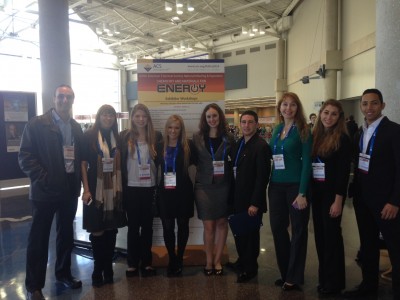NSU Newsroom
SharkBytes
Horizons
This version of NSU News has been archived as of February 28, 2019. To search through archived articles, visit nova.edu/search. To access the new version of NSU News, visit news.nova.edu.
This version of SharkBytes has been archived as of February 28, 2019. To search through archived articles, visit nova.edu/search. To access the new version of SharkBytes, visit sharkbytes.nova.edu.
Students Present Research, Earn Recognition at Chemical Society Conference in Dallas

Dimitrios Giarikos, Ph.D., associate professor and assistant director of the college’s Division of Math, Science, and Technology; Maria Ballester, Ph.D., associate professor; Jessica Millar, Honors biology major; Amelia Hartzell, Honors biology major; Catherine Chiafair, Honors biology major; Christopher Lynch, biology major; Beatrix Aukszi, Ph.D., assistant professor; Biana Modilevsky, Honors biology major; and Luis Perez, Honors biology major
Six undergraduate biology majors from the Farquhar College of Arts and Sciences presented their research at the 247th American Chemical Society (ACS) National Meeting and Exposition, held in Dallas, Texas, Mar. 16–20. In addition, one student earned a recognition award for his presentation, and NSU’s ACS Chapter Chemistry Club earned an Honorable Mention award from the society for its noteworthy activities completed during the 2012–2013 academic year.
The following research posters were presented at the meeting:
“A P450 Metabolism Experiment for Undergraduate Biochemistry Laboratories”
Presenter: Catherine Chiafair, Honors biology major
Faculty Advisers: Dimitrios Giarikos, Ph.D., associate professor and assistant director of the college’s Division of Math, Science, and Technology; and Reza Razeghifard, Ph.D., associate professor and coordinator of physical sciences
From the Abstract: “A laboratory experiment is described to provide students hands-on experience in learning some aspects of microsomal P450-catalyzed metabolism. Undergraduate students in the biochemistry laboratories detect and quantify the metabolites produced from butylated hydroxytoluene by liver microsomes using Gas Chromatography-Mass Spectrometry (GC-MS) techniques. The laboratory provides training to students for handling active microsomes, sample cleanup of biological matrices, extraction of organic metabolites, GC-MS analysis and data interpretation of complex mixture, and collaborative work.”
“Complete Synthesis of Carbonyl-Containing Compounds: A Guided Inquiry Approach”
Presenter: Amelia Hartzell, Honors biology major
Faculty Adviser: Beatrix Aukszi, Ph.D., assistant professor*
*Aukszi also serves as an adviser for NSU’s ACS Chapter Chemistry Club
From the Abstract: “This project focuses on the design of an upper-level synthetic organic chemistry course, which is intended as a crossover between undergraduate organic chemistry courses and graduate school. It will allow students to gain useful experience in the laboratory before entering graduate or professional school. The course will allow students to advance their abilities to evaluate novel work. Students will judge classmates’ proposed synthetic routes, utilizing a peer-review approach. Novel synthetic routes focused on carbonyl chemistry will be designed, and the target compounds obtained will be purified and characterized throughout the course of the class. Research thus far has focused on developing both a starting compound and target molecule library.”
“Guided Inquiry: Synthetic Investigation of Aromatic Systems”
Presenter: Christopher Lynch, biology major**
Faculty Adviser: Beatrix Aukszi, Ph.D., assistant professor
From the Abstract: “The focus of this investigation is to aid the development of a new advanced synthetic organic chemistry course, aiming for the development of possible synthetic routes of aromatic systems. Through a guided inquiry approach, students will be in charge of designing an entire synthetic route to develop a target compound. Proposed projects will be presented in class, and feedback will be provided using a peer-review system to allow for improvements. Refined routes will then be carried out in the laboratory.”
**Lynch earned an Undergraduate Research Poster recognition award from the ACS Committee on Education for this presentation
“Molecular Modeling of tetra(methylpyridyl) Porphines Binding to φX174 DNA Sequences”
Presenter: Jessica Millar, Honors biology major
Faculty Advisers: Maria Ballester, Ph.D., associate professor*, and Stephen Winkle, Ph.D., associate professor at Florida International University
*Ballester also serves as an adviser for NSU’s ACS Chapter Chemistry Club
From the Abstract: “Porphyrins are large, naturally occurring macrocycles that are often highly substituted, thereby giving them a wide variety of unique properties. Through the use of computer geometry optimization, it is possible to determine the relationship between porphyrin conformation, their associated energy, and the effects of porphyrin binding to DNA. … By careful analysis of the conformation and possible sequence binding, it is possible to predict the binding stability and preferential binding of porphyrins DNA and enzyme inhibition in restriction enzyme assays and the prediction the thermodynamic stability of binding within an organism.”
“NH-Tautomerism in Para-Substituted Tetraphenylporphyrin Derivatives”
Presenter: Biana Modilevsky, Honors biology major
Faculty Adviser: Maria Ballester, Ph.D., associate professor
From the Abstract: “Variable-temperature proton NMR spectroscopy was used to study the tautomerization of substituted tetraphenylporphyrins. The results are interpreted by using substituent electronic and steric effects, and the degree of in-plane and out-of-plane distortions of the porphyrin core. … The energy barriers for tautomerization may be interpreted through the degree of distortion of the porphyrin core.”
“A Collection of Inorganic and Organometallic Chemistry Experiments that Promote Student Learning Through Computational Analysis and Modern Chemical and Instrumentation Techniques”
Presenter: Luis Perez, Honors biology major
Faculty Adviser: Dimitrios Giarikos, Ph.D., associate professor and assistant director of the college’s Division of Math, Science, and Technology
From the Abstract: “A series of advanced undergraduate inorganic chemistry experiments were designed to teach students hands-on synthetic inorganic chemistry through computational analysis, modern technology, and advanced chemical and instrumentation techniques. … A number of these experiments overlap with fields of chemistry such as general, organic, analytical, and biochemistry, which provides students with a complete pedagogical approach and instructors with choices that assist them to rapidly and easily tailor and customize their inorganic chemistry laboratory courses.”